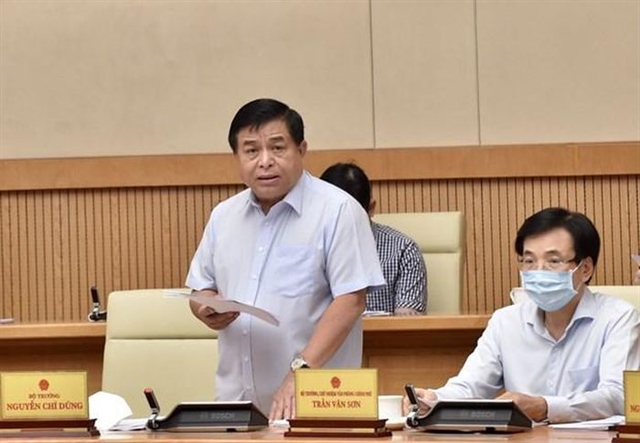After more than two years of implementing the Planning Law effective from January 1, 2019, ministries, sectors and localities need to strengthen cooperation and share information among them to further improve the investment and business environment. Minister of Planning and Investment Nguyen Chi Dung spoke to the local media about this issue.

In the process of building planning, ministries, branches and localities have abolished plans on specific goods, products and services to simplify business conditions and create a fair investment environment.
After more than two years of implementing the Planning Law effective from January 1, 2019, ministries, sectors and localities need to strengthen cooperation and share information among them to further improve the investment and business environment.
Minister of Planning and Investment Nguyen Chi Dung spoke to the local media about this issue.
After two years of implementing the Law on Planning, what positive changes have been made by ministries, sectors and localities in this field?
Ministries, sectors and localities have actively implemented the Law on Planning and achieved many positive results.
Regarding institutional improvement, documents guiding the implementation of the Law on Planning as well as laws and ordinances relating to planning have been promulgated to create a necessary legal corridor for implementing the planning work in the future.
Based on the Law on Planning, they also expect this year to complete building and appraisal of 19 national sector plans, one regional plan and 26 provincial plans.
In 2022, 19 national sectoral master plans, five regional master plans and 37 provincial master plans will be completed and submitted for appraisal.
They have implemented this law in the direction of abolishing master plans on specific goods and services and replacing them with standards and regulations.
This has contributed to simplifying business conditions for businesses and investors, and at the same time creating a fair investment and business environment in Viet Nam.
The quality of planning of ministries, sectors and localities has been improved with the planning approaching many sectors and applying advanced technologies, thereby avoiding overlaps and conflicts as before.
To achieve those results, the monitoring and evaluation of building the plans have been the focus. Accordingly, the information system and national database on planning were built to ensure transparency of information and data on planning. This will effectively support investment management, promotion and attraction.
What are the challenges in implementing the Law on Planning of ministries, sectors and localities?
They have still faced some difficulties in implementing the Law on Planning in recent years. Of which, the issuance of a number of documents guiding in detail to implement the laws and ordinances related to planning has been slow and many of them are still not consistent with the Law on Planning.
This has caused difficulties for ministries, sectors and localities in the building and appraisal of master plans.
On the other hand, many localities are facing difficulties in implementing the new provisions of the Law on Planning, especially the method of building plans according to the integrated and multi-sectoral model. The provincial planning according to the new method is expected to involve about 50 kinds of sectoral and field development plans. Therefore, the planning requires close coordination between sectors and the application of advanced technology.
At present, the progress of planning for the 2021-2030 period of ministries and localities is still slow compared to the actual requirements.
In addition, the coordination between ministries, sectors and localities in the development of planning is still limited. Therefore, the information and database have not been synchronously built to support planning in the future.
At present, the COVID-19 pandemic is greatly affecting planning, including the implementation of surveys, collection of data and consultations. It causes difficulties in inviting experts relating to planning development, especially for international consulting organisations.
What are the solutions to these problems?
The Ministry of Planning and Investment has been reviewing and evaluating the implementation of the Law on Planning to promptly report to the Government for resolving those challenges.
At the online national conference on planning chaired by the Prime Minister on August 19, many important solutions were mentioned, aiming to create positive changes in implementing the planning law. Of which, quality and efficiency of planning work must be improved in the future.
Accordingly, the responsibility of local and ministerial leaders in determining tasks and solutions will be enhanced in accelerating progress and improving the quality of planning, appraisal and approval for the 2021-2030 period.
The establishment of a National Steering Committee on Planning is considered in order to direct, urge and coordinate ministries, ministerial-level agencies and localities in the implementation of national, regional and local planning.
In terms of institutions, a number of provisions guiding the implementation of laws and ordinances related to planning that are inconsistent with the Planning Law have been reviewed to amend or abolish them.
The Government also needs to issue a resolution on implementing tasks and solutions to remove difficulties in mechanisms and policies related to planning.
This year is the first year of implementing the country's socio-economic development strategy for the 2021-2030 period, so ministries, sectors and localities are focusing on developing national, regional and local plans for this period.
This is a great opportunity for them to define vision and development goals, thereby opening up new development opportunities and promoting resources for sustainable socio-economic development.
Planning follows the integrated multi-sectoral model to promote the consistency in State management and sectoral and regional linkages in carrying out the development goals. — VNS





